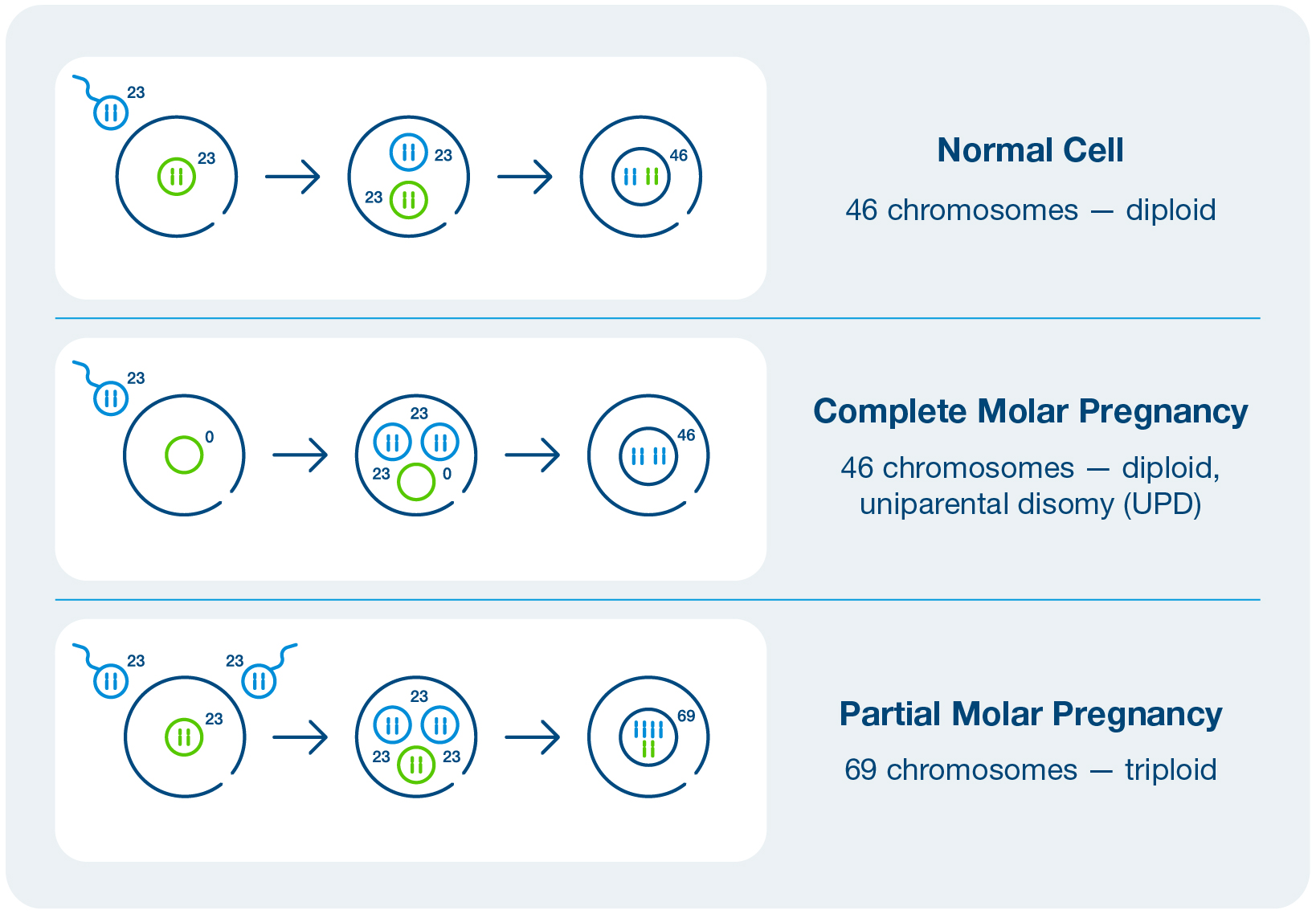Understanding Molar Pregnancy

A pregnancy loss can be devastating and, in rare cases, can come with complications that require monitoring and potentially treatment to protect the mother’s health. A molar pregnancy is a potentially dangerous complication that is often indistinguishable from other causes of miscarriage.
What Is a Molar Pregnancy?
A molar pregnancy is a rare but serious condition that occurs in approximately 1 in 1,000 pregnancies.1 During a molar pregnancy, a tumor called a hydatidiform mole forms instead of a healthy placenta. Even after a miscarriage has occurred, molar pregnancy puts the mother at risk for developing gestational trophoblastic disease (GTD), a rare form of uterine cancer, if abnormal placenta cells continue to grow. Women who experience a miscarriage due to a molar pregnancy should receive regular blood tests to monitor for signs of GTD.
In addition to the health risks a molar pregnancy poses for a mother, the experience can be emotionally difficult because early on a molar pregnancy appears like a normal pregnancy. It is common to experience grief following a molar pregnancy, as with any pregnancy loss
What Causes a Molar Pregnancy?
During normal fertilization, an embryo receives two copies of each chromosome, one from the egg and one from the sperm. A molar pregnancy occurs when an error happens during fertilization, leading to an additional set of chromosomes from the father.
There are two types of molar pregnancy:
- Complete Molar Pregnancy – An abnormal, empty egg with no chromosomes from the mother is fertilized by two sperm, leading to a cell that has two sets of chromosomes from the father and none from the mother. In this situation, an embryo will not grow, and only abnormal placenta cells form.
- Partial Molar Pregnancy – A normal egg is fertilized by two sperm, leading to an embryo with one set of chromosomes from the mother and two sets of chromosomes from the father. In this case, in addition to an abnormal placenta, an embryo may develop, but will have severe defects and usually will not survive past the first trimester.
In all cases, the resulting fertilized egg will have chromosomal abnormalities related to an extra set of chromosomes from the father.

What Are the Symptoms of a Molar Pregnancy?
Common signs of molar pregnancy that can be recognized at home are:1
- Vaginal bleeding during the first trimester
- Severe nausea
- Pelvic pain
- Passing grapelike cysts from the vagina
A woman’s doctor can also detect symptoms including:1
- High blood pressure/preeclampsia
- Faster than average uterus growth
- Anemia
- Overactive thyroid
Can Molar Pregnancy Be Prevented?
A molar pregnancy cannot be prevented and is not caused by anything a mother does or doesn’t do. Risk factors include:2
- Maternal age of younger than 20 or older than 40
- A previous molar pregnancy
- A history of miscarriage
What Does a Molar Pregnancy Mean or Future Pregnancies?
Unfortunately, having one molar pregnancy increases the risk of a future molar pregnancy by 1-2%.2 It is usually recommended that a woman wait up to a year after a molar pregnancy before attempting to conceive again. During this time, her doctor will monitor blood hCG levels for GTD, which is usually curable when detected and treated. The risk of GTD is approximately 20% following a complete molar pregnancy and 5% following a partial molar pregnancy.
Women who have had a molar pregnancy in the past are monitored carefully during early pregnancy and may opt to perform genetic testing early in the first trimester to confirm healthy chromosome results in the developing pregnancy.
Was My Miscarriage a Molar Pregnancy?
One method of detecting molar pregnancy following a miscarriage is genetic miscarriage testing with AnoraTM. Anora is the only miscarriage test that can determine if an embryo is missing maternal chromosomes or has too many paternal chromosomes, detecting both complete and partial molar pregnancy.3 If Anora results suggest molar pregnancy, it is important to speak with your doctor about follow-up care to protect your long-term health.
If you’ve experienced a pregnancy loss and want to understand if there was a genetic cause, visit natera.com/anora/ to learn more about Anora.
For questions about the cost of Anora, please contact Natera billing at 1-844-384-2996 between 8am-7pm Central Time, Monday-Friday. Natera billing will provide personalized cost estimates as part of our Price Transparency Program.
References
1https://www.mayoclinic.org/diseases-conditions/molar-pregnancy/symptoms-causes/syc-20375175. Accessed September 2021.
2https://americanpregnancy.org/healthy-pregnancy/birth-defects/molar-pregnancy/. Accessed September 2021.
3Maisenbacher et al. Fertil Steril. 2019;112(4):700-6
*Anora has been developed and its performance characteristics determined by the CLIA-certified laboratory performing the test. The test has not been cleared or approved by the US Food and Drug Administration (FDA). CAP accredited, ISO 13485 certified, and CLIA certified. © 2021 Natera, Inc. All Rights Reserved.
